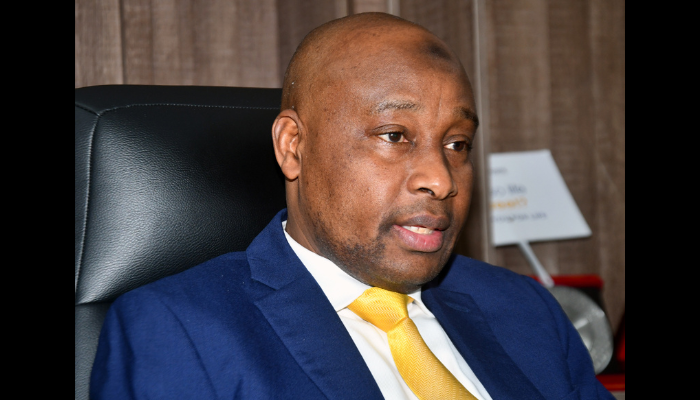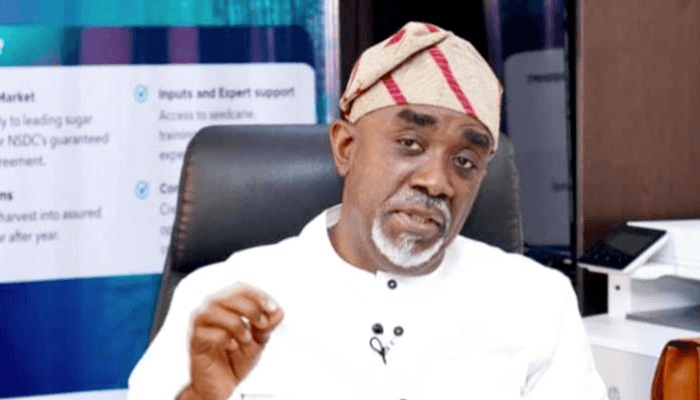At a time when Nigeria’s financial landscape is under intense pressure to innovate and rebuild public trust, Jaiz Bank has emerged as a case study in values-driven growth. At the helm is Haruna Musa, a seasoned banker who was headhunted from GTBank with a clear mandate: restructure, reposition, and accelerate the performance of Nigeria’s pioneer non-interest bank.
Musa holds a first degree in agriculture from Ahmadu Bello University, Zaria, and went on to earn a Master of Business Administration (MBA) from Bayero University, Kano. He has had further studies at Cranfield University in the UK (finance) and the University of Utara, Malaysia (a master’s degree and a PhD, as well as a course in Islamic banking).
So, he brought over 27 years of expertise spanning corporate banking, risk management, and strategy in a career that has taken him through several leading financial institutions across Nigeria. He’s therefore equipped with both technical depth and a broad understanding of different sectors of the economy, not only in Nigeria but across Africa as well.
He is, in his words, “driven by integrity, discipline, and a strong commitment to inclusive growth. Beyond banking, I am deeply passionate about ethical leadership, family values, and creating financial solutions that empower individuals and communities.”
In this exclusive conversation with BusinessDay’s General Manager, Bashir Ibrahim Hassan, Musa reflects on his leadership journey, the transformation of Jaiz Bank, and why he believes non-interest banking offers not just an alternative but the future of Nigeria’s financial system. Excerpt…
“Importantly, we welcome this competition because the market is far from saturated. Financial inclusion is the primary target of non-interest banking, and there are still over 30 million Nigerians outside the financial system. With Nigeria’s large population and significant GDP, the space is big enough for multiple players to thrive.”
To begin with, could you share one or two key accomplishments that you are most proud of before assuming duties as Chief Executive Officer of this bank?
Honestly, when I look back with nostalgia, one of the accomplishments I am most proud of was being head-hunted by the board of Jaiz Bank while serving as an executive director at GTBank. The mandate was very clear from the outset: they needed someone competent enough to restructure, re-engineer, and reposition the bank for stronger financial performance and enhanced corporate governance.
When I assumed leadership at Jaiz Bank, I met a strong foundation as Nigeria’s pioneer non-interest bank. However, I immediately recognised the need to accelerate growth, strengthen governance structures, and reposition the institution for long-term sustainability. Leading that transformation journey remains one of my proudest professional milestones.
One could see very clearly that things have been changing in the bank in terms of visibility and growth—the figures are out. Specifically, what has been your plan for the bank upon assumption of duties, and what are your key accomplishments so far in aligning with that plan or vision?
When I assumed duty at the bank, I quickly realised we had a wealth of competent employees. What was needed was motivation and confidence-building. As a leader, my role was to inspire people to believe they could achieve more than they thought possible. So, my first priority was to motivate the team, broaden their mindset, and instill the belief that nothing is impossible.
From day one, I held a meeting with senior management to understand their key concerns and challenges. Immediately after, we organised a town hall meeting in Abuja, one of our major regional hubs, where I engaged directly with employees. We discussed innovation and the risks of stagnation, drawing lessons from companies like Nokia and Polaroid that failed because they did not adapt. This dialogue underscored the urgent need for cultural change and innovation within our bank.
“We took the early criticisms in good faith and turned them into inspiration. Rather than discouraging us, they pushed us to engage customers more deeply and refine our brand identity. The result has been stronger customer engagement and greater brand recognition.”
Together with my leadership team, we visited our hubs in Kano and Lagos, meeting staff across the regions. These conversations yielded 23 major concerns from employees, which essentially became our roadmap for transformation. This made the task easier because the people on the ground had already pointed us to the solutions.
We then set out to transform the organisational culture into one of high performance. To support this, we engaged cultural experts who trained nearly all our staff on the importance of mindset shifts and performance-driven values. The results were almost immediate.
When I joined in late November 2023, the bank’s annual profit was around ₦6.4 billion. Just one month later, by December 31, 2023, profitability had risen to ₦11.2 billion. With a full year of reforms in 2024, we doubled nearly all key performance indices. Profits grew from ₦11.4 billion to ₦24.6 billion within a year. Our balance sheet expanded by more than 100 per cent, crossing the ₦1 trillion mark in total assets.
We also accelerated our digital transformation, deepening mobile and agency banking channels to make Jaiz Bank more accessible nationwide. Beyond this, we prioritised financing in critical growth areas: retail banking, SMEs, and agriculture. With Nigeria’s population exceeding 200 million, the retail market is vast, while SMEs, providing nearly 70 percent of employment, are the backbone of the economy. Agriculture, with its significant contribution to GDP, also became a priority focus for us.
We have been able to deepen the bank’s digital landscape through our digital transformation initiatives, particularly mobile and agency banking, which have made Jaiz Bank more accessible to customers across the country.
We are also focused on expanding financing into critical sectors, especially retail. Nigeria, with its population of over 200 million, presents enormous potential for retail banking. In addition, we recognise that small, micro, and medium enterprises are the engine of growth, providing nearly 70 percent of employment. Supporting SMEs remains a central part of our financing strategy.
Agriculture, given its significant contribution to GDP, is another priority area. Our focus on agricultural financing has already had a positive impact on the bank. Similarly, we are investing in renewable energy, in line with both national and global priorities around the transition from fossil fuels to sustainable energy sources.
Lastly, our commitment lies in fostering an ethical culture. Non-interest banking, often misunderstood as being exclusively for people of Islamic faith, is in fact for everyone who values ethical financing. It provides a platform for all faiths and for anyone seeking transparency and responsibility in business.
These are the key areas where we are driving growth and making a positive impact.
How much progress has the bank made in changing the perception that non-interest banking is only for Muslims? Do you have a communication plan to address this, whether directly with customers or through customer-to-customer engagement? How are you dealing with this challenge, given that it remains a major issue?
Yes, it is a big issue in the country, and we are very intentional about addressing it. Our first step has been to consistently educate both our existing customers and prospective ones on what non-interest banking truly represents. Through our corporate communications, we share messages, campaigns, and explanatory videos to demystify the concept and show that it is not limited to Muslims; it is an ethical model open to everyone.
Interestingly, the proportion of non-Muslim customers in our bank has been growing steadily. Once people understand how the model works, they feel very comfortable with it and often embrace it as a more transparent and ethical alternative. That has encouraged us to deepen our customer engagement and expand awareness initiatives.
Going forward, we are also leveraging platforms like the CBN’s annual Financial Literacy Week. Beyond the usual financial education, we will use that opportunity to educate Nigerians specifically on non-interest banking. For us at Jaiz Bank, changing this perception is not a one-off effort; it is a continuous process of engagement, education, and trust-building with the public.
Your performance so far has been quite impressive, with clear vision and innovation driving success. But looking ahead, where do you see this bank in the next two to three years, and how do you plan to sustain this impressive record of performance?
That’s a very important question. To be candid, in the short to medium term, we envision Jaiz Bank becoming not just the undisputed leader in non-interest banking in Nigeria, which we already are today, but also a dominant player across Africa. Our stakeholders can expect a future of responsible expansion and innovation beyond the horizon.
Over the next two to three years, our priority will be deepening digital adoption to reach millions of unbanked people. While Nigeria has made significant progress in reducing financial exclusion nationally, there are still regions where exclusion levels exceed 80 percent. In such areas, for every 10 people, barely two are within the financial system. Without bringing these communities into the financial cycle, it is impossible to fight poverty or achieve meaningful progress. That is why financial inclusion will remain at the core of our strategy, taking banking services to places traditional banks find unprofitable or inaccessible.
We will also expand our focus on green and sustainable financing. Today, even the middle class is struggling with energy costs, whether from fuelling cars or paying electricity bills. By prioritising renewable energy and climate-smart agriculture, we aim to ease these burdens while creating long-term impact for our customers and communities.
Equally important is investment in people. We will continue to build capacity in our staff, support our customers, and invest in our communities. When you empower people, they can achieve extraordinary things, and this is central to our vision of inclusive growth.
In short, the future for Jaiz Bank is about scaling, sustainability, and impact, ensuring that every action we take strengthens our communities, creates opportunities for our customers, and aligns with the Central Bank of Nigeria’s mandate to bring everyone into the financial ecosystem.
In terms of figures, how much are you looking at achieving in profit margins and related financial targets?
We expect our profitability to grow to over ₦100 billion in the near term. Beyond financial performance, our vision is to establish a strong presence in all 36 states of the federation, ensuring that every Nigerian has access to our services. A key part of this expansion is reaching underserved and unbanked areas, where traditional banks often do not operate. By doing so, we are not only driving profitability but also fostering inclusive growth across the entire country.
Read also: Jaiz bank reports 121% surge in profit to ₦24.44bn,
You’ve stated quite assertively that your bank is the indisputable leader in the non-interest banking space in Nigeria. What makes you confident about this claim, and what are the key reasons behind it?
First and foremost, JAIZ has paid its price in pioneering non-interest banking in Nigeria. When we started almost 14 years ago, there wasn’t a single product in this space. Every product that other non-interest banks now offer was first conceived, developed, and launched by JAIZ Bank. That pioneering effort gave us unmatched expertise and credibility.
Secondly, JAIZ achieved what many considered impossible at the time. Despite starting from scratch, with no products, no precedent, and considerable uncertainty about the viability of non-interest banking in Nigeria, we achieved break-even within just three years. That milestone alone speaks to our resilience and leadership.
Today, many new players have entered the non-interest banking market, but the truth is that almost all of them look to JAIZ as their reference point. Whether it is training staff, onboarding their Committee of Sharia Experts, or designing new products, JAIZ remains the model others turn to. In fact, most of the products launched by new entrants are adapted versions of what we first developed. We are proud to serve as the “big brother” of the industry.
Importantly, we welcome this competition because the market is far from saturated. Financial inclusion is the primary target of non-interest banking, and there are still over 30 million Nigerians outside the financial system. With Nigeria’s large population and significant GDP, the space is big enough for multiple players to thrive.
So, when we say we are the indisputable leader in non-interest banking, it is not a boast; it is a reflection of our pioneering role, our proven resilience, and our continued influence in shaping the industry.
As the acknowledged “big brother” in the non-interest banking space, what makes JAIZ Bank stand out from other non-interest banks in the country? Specifically, what do you tell existing customers of other non-interest banks, as well as those who have not yet embraced non-interest banking, about what makes JAIZ exceptionally different—offering something they cannot find elsewhere?
At JAIZ Bank, we believe our biggest distinction lies in our unwavering commitment to ethics. The defining difference between conventional banking and non-interest banking is adherence to shariah-compliant principles, and on that front, JAIZ stands exceptionally tall. Our operations are rooted in integrity and transparency, and we consistently ensure strict compliance with these principles, the very foundation of non-interest banking.
Beyond that, we are the knowledge base of the industry. Every other non-interest bank in Nigeria, in one way or another, benefits from the expertise that JAIZ has built over the years. Many of their staff and even members of their Sharia Advisory Committees were trained at JAIZ. In fact, it is almost impossible to walk into any non-interest bank in the country without finding an ex-JAIZ staff member contributing to its success. That makes us not just a competitor but the foundation upon which the entire industry is being built.
So, when we tell customers what makes us different, it is this combination of deep-rooted ethics, proven compliance, and unmatched industry leadership. Customers banking with JAIZ are not only accessing products and services; they are connecting to the very institution that pioneered and continues to shape non-interest banking in Nigeria. That is what makes us stand tall and truly exceptional.
Why did you decide to rebrand?
The rebranding was inspired by our evolution as a bank over the last 13 years. Having matured from our pioneering days into a recognised leader in non-interest banking, it became clear that our brand identity needed to reflect both our heritage and our forward-looking vision.
Our ambition is bold: to be among the top 10 banks in Nigeria within the next five years. To achieve that, we needed a refreshed identity that communicates not only our pioneering status but also our accessibility, freshness, and continued relevance in the industry.
The rebrand was therefore more than just a change of logo or colours. It was about reaffirming our ethical foundation while projecting innovation, maturity, and inclusiveness. And the results are already visible: customer engagement has improved significantly, and in fact, recent data from our corporate communications team shows that, in some social media indices, we’ve moved from number five to number two among Nigerian banks.
In short, the rebranding signals who we are today, a mature, ethical, and innovative bank, and where we are headed tomorrow.
Despite all the backlashes at the beginning, did you receive the comments and feedback?
Of course, we did receive the comments, and we welcomed them. In fact, we believe that when people talk, whether positively or critically, it’s a sign that you are doing something worth noticing. If no one is commenting, it means you’re not making an impact.
We took the early criticisms in good faith and turned them into inspiration. Rather than discouraging us, they pushed us to engage customers more deeply and refine our brand identity. The result has been stronger customer engagement and greater brand recognition.
Today, the refreshed identity, from the colours to the overall brand feel, resonates much better with people. What began as backlash has ultimately strengthened the connection between JAIZ Bank and its stakeholders.
Why did you choose this particular colour — the yellow — instead of sticking with the blue?
We chose mustard yellow because it is refreshing, vibrant, and exciting. It reflects energy and optimism, qualities that resonate strongly with Nigeria’s youthful population, which makes up almost 70 percent of the country. We aspire to appeal to this young generation, and we are already seeing the impact: social media engagement indices clearly show we are moving in the right direction.
Internally, the rebranding has energised our staff and reinforced our culture of excellence. The excitement during the rebrand launch was a clear signal of renewed commitment. Externally, the new Jaiz Bank logo positions us not just as a bank for today, but as a partner for the future. It reflects our vision of leading ethical finance in Nigeria and beyond.
You mentioned that it’s the same values, but with more commitment. Can you elaborate on what you mean by that?
When we say “same values with more commitment”, we mean that our ethical foundation remains unchanged; we are still deeply rooted in integrity and ethical finance. What has evolved is our level of dedication to customers. We are more committed than ever to delivering exceptional customer experiences, expanding digital and electronic channels, and being true partners for life.
Our tagline, “With you for life”, reflects this. From opening a minor’s account for your child to financing your first home through our Ijara product, supporting you with vehicle financing, including electric vehicles, and managing your first salary account, Jaiz Bank is designed to grow with you at every stage of life. We remain the same in values but stronger in commitment to walk with our customers throughout their journey.
How do you see the future of the Nigerian economy within the context of the non-interest banking system, given that you are positioning to compete with conventional banks?
Honestly speaking, by the time people truly understand the non-interest banking model, they will see that it is one of the best financing frameworks available. In fact, the current Minister of Finance remarked at the start of this administration, about two years ago, that non-interest banking represents the future of this country.
Why? Because, unlike conventional banking, our model is fundamentally asset-based and tied to real economic development. It is not about simply handing someone cash to spend but about creating value through asset-backed transactions. A clear example is the Sukuk initiative, which has given the government a forward-looking financing tool. Every naira generated from Sukuk is transparently traceable to the specific projects it funds. If you move around Abuja, Lagos, or even across the East, you will see major federal infrastructure projects financed through this model.
Beyond transparency, non-interest banking is rooted in ethics, openness, and fairness. Once we enter a financing contract, the terms are fixed and cannot be altered midway. Unlike conventional banks that can adjust interest rates with just a seven-day notice, we are bound to honour the agreed terms until the contract is fully concluded. This ensures trust, stability, and value for money for both parties.
It is this openness and commitment to fairness that truly differentiates non-interest banking, making it not just an alternative but, in my view, the most sustainable financial model for Nigeria’s future.
What legacy are you personally committed to leaving behind in Jaiz Bank, whether you step down in the next three or five years or at any other time?
Honestly, when I think of legacy, it’s not just about me alone but about the management, the staff, and the board of Jaiz Bank. But speaking personally, I would be most fulfilled to see Jaiz Bank expand beyond Nigeria, to walk into a branch in Ghana or Côte d’Ivoire, and to see the bank firmly established across the continent. International expansion would be a proud legacy for me. I would also like Jaiz to remain the leading training ground for talent entering the non-interest banking space, shaping the next generation of professionals. Finally, I want to see Jaiz among the top ten players in the Nigerian banking industry, not just in non-interest banking but across the entire financial sector. That, to me, would be a legacy worth leaving behind.











